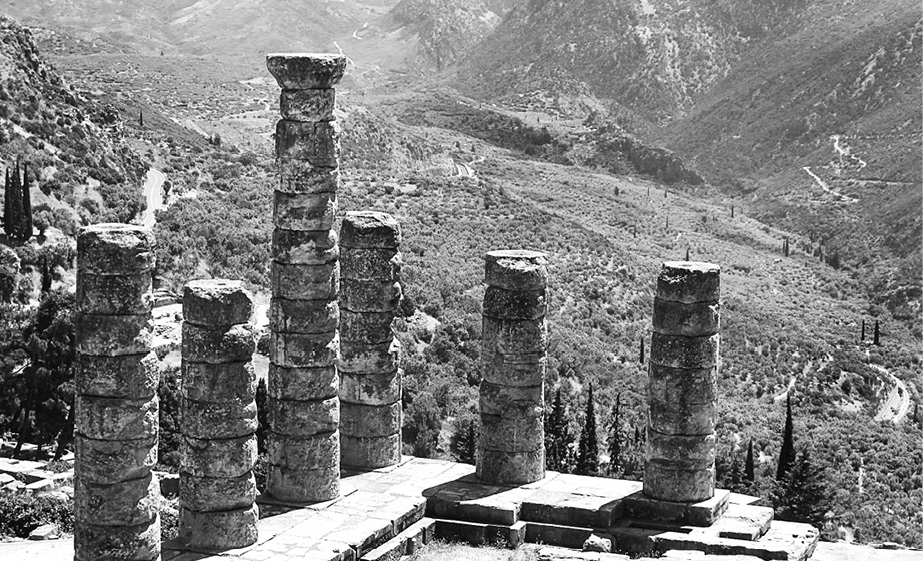Greece Goodness

Temple of Apollo, Delphi, Greece.
The value that defines Greece is so long-standing, so all-encompassing, that it has been talked about by luminaries of both the ancient and modern worlds: from Pindar to Plato, Saint Paul the Apostle, and Barack Obama.
This is philotimo, an idea with deep roots in one of the world’s oldest civilizations, which everyone knows but no one can entirely agree on an apt translation for.
With philotimo you are literally a “friend of honor,” but the etymology of the word only goes so far in explaining its meaning and significance. Often quoted is the explanation of the ascetic monk Paisios, who wrote, “Philotimo is the reverent distillation of goodness, the love shown by humble people, from which every trace of self has been filtered out. Their hearts are full of gratitude toward God and to their fellow men, and out of spiritual sensitivity, they try to repay the slightest good which others do them.”
I am choosing to follow him and define philotimo for this purpose as goodness. Because philotimo is about seeing the good in people, it is about doing good and helpful things for their own sake, and trying to be a good person who contributes positively to the lives of your friends, family, and community. It is about what is good for the world around you, not for you as an individual; and about what’s good not just for now, but the long term.
Under philotimo, you always seek to do the right thing, looking at the big picture. And by aspiring to goodness as the Greeks do, we can also demonstrate many other values: respect, selflessness, humility, empathy, generosity, and gratitude. All these are things that philotimo represents and supports.
At the core of philotimo is to help others in need, something that has been brought into sharp relief in Greece by the refugee crisis sparked by the Syrian civil war. At its peak, over a million refugees arrived on Greek shores in 2015 and 2016. This came in the context of the soaring unemployment and poverty that have afflicted Greece since the economy collapsed under piles of debt in the aftermath of the financial crisis, and stringent austerity measures imposed by the EU as part of its bailout.
Yet just at the moment when Greeks were dealing with so much economic pain domestically, many showed philotimo to refugees arriving in precarious vessels and in desperate need. Stories abounded of Greek islanders who waded into the water to help people ashore, families who offered accommodation, and shops that donated scarce supplies. As a nation, Greece has struggled in some ways to cope with the demands of the mass migration, with shocking conditions reported in several refugee camps. But as a people, Greeks proved the statement of one of their nation’s earliest philosophers, Thales of Miletus, who said that “Philotimo to a Greek is like breathing. A Greek is not a Greek without it.” They showed that philotimo is a timeless value and one that will be demonstrated regardless of context or circumstance. You do the right thing without thinking about what the consequences might be—in the mold of ancient Greek figures such as Pheidippides, the original marathon runner who died after running the 26.2 miles to Athens from the scene of the Battle of Marathon, to deliver news of the Greek victory.
Greece is a place where you cannot help but reflect on yourself and your values. This is especially true if, as I did, you visit the Temple of Apollo at Delphi and its famous inscription: “Know thyself.” This is the saying that prompted an equally famous Socratic aphorism—“the unexamined life is not worth living”—and a Shakespearean echo in Hamlet: “To thine own self be true.” This is something that matters hugely to me: unless you are honest to yourself—and live by your values—you can never give of yourself in the way that philotimo demands.
Observing the power of Greek goodness and philotimo in action is a powerful spur for self-reflection and introspection. When we decide to err on the side of goodness, and to do the right thing regardless of our self-interest, it can change everything about us and how we see the world. We become more generous, more considerate, more open to other people and conscious of their needs. We see the bigger picture—one beyond our own interest and the short-term imperative, and gain important perspective on what matters. Philotimo is not just an important value in its own right, but one that acts as a gateway to many of those I have written about in this book.